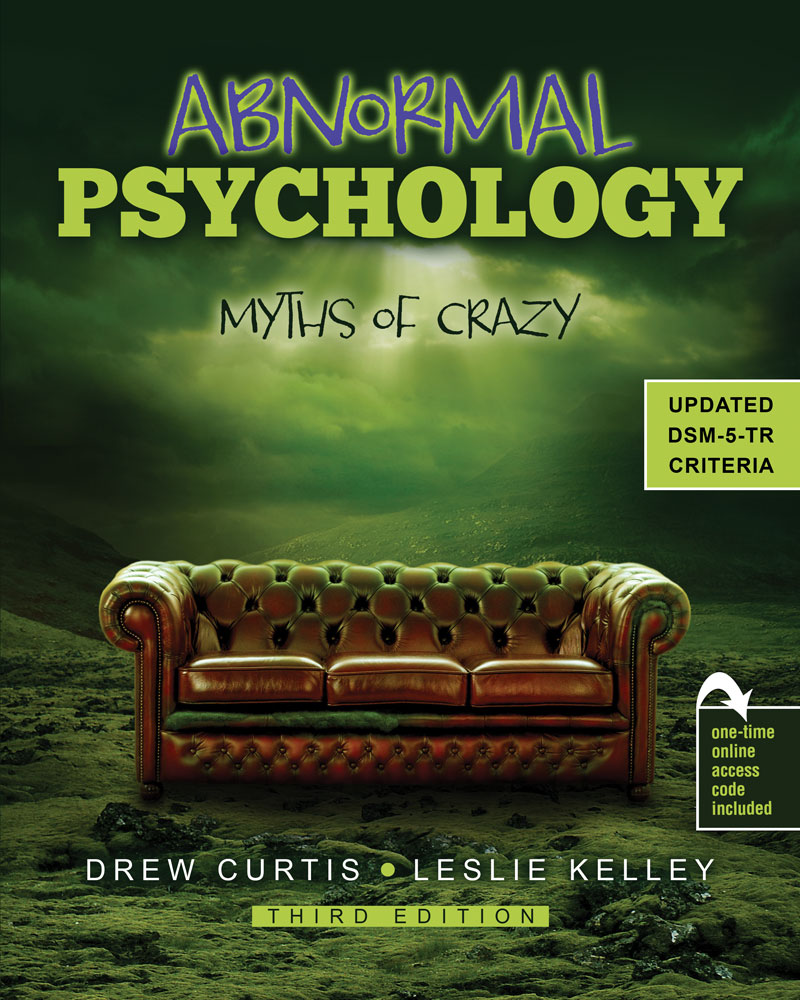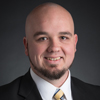For over a century, movies and media have promoted myths of psychopathology and normalcy that have been absorbed into our daily perception.
Abnormal Psychology: Myths of ‘Crazy’ challenges students to reconsider the ideas they have concerning myths of “crazy” and how these ideas developed.
Abnormal Psychology: Myths of ‘Crazy’ guides readers in the deconstruction of these myths by means of a process designed to help formulate a sound approach to abnormality and a thorough understanding of various disorders through the lens of the DSM-5. Students will learn the importance of intentionally directing attention toward the humanity of the individuals who have various disorders, in order to develop more accurate perceptions of these individuals. The goal is to reflect on the humanity within abnormality rather than reducing people to a label and stripping them of their humanity. Readers will be confronted with the idea that abnormality is not exemplified by “crazies” in a straight-jacket, void of coherent words, but rather by human persons, who are often suffering, feeling immense pain, or who have impaired functioning in their life, which may even include being void of coherent words.
If you’re ready to challenge your assumptions and expand your understanding of psychopathology, then crack this “crazy” book open and get to reading!
CHAPTER ONE Understanding Abnormality: A Look at “Crazy”
CHAPTER TWO Theory Informs Treatment
CHAPTER THREE Assessment and Diagnosis
CHAPTER FOUR The Value of Research: A Good Consumer
CHAPTER FIVE Neurodevelopmental and Elimination Disorders
CHAPTER SIX Schizophrenia Spectrum and Psychotic Disorders
CHAPTER SEVEN Depressive and Bipolar Disorders
CHAPTER EIGHT Anxiety Disorders, Obsessive-Compulsive Disorder, and Related Disorders
CHAPTER NINE Trauma and Dissociative Disorders
CHAPTER TEN Somatic Symptom and Related Disorders
CHAPTER ELEVEN Eating Disorders
CHAPTER TWELVE Sleep Disorders
CHAPTER THIRTEEN Sex and Gender Disorders
CHAPTER FOURTEEN Substance-Related, Impulse-Control, and Conduct Disorders
CHAPTER FIFTEEN Neurocognitive Disorders
CHAPTER SIXTEEN Personality Disorders
CHAPTER SEVENTEEN Myths and Controversies in Practice, Ethics, and Law
Drew A. Curtis, Ph.D. is the Executive Associate to the Dean, Rodgers Distinguished Faculty, Director of the Psy.D. and M.S. Counseling Psychology programs, and a licensed psychologist at Angelo State University (ASU). He is proudly serving as the Chief Executive Officer of the Southwestern psychological Association and President for Psychological Association of Greater West Texas. Dr. Curtis is also a past president of the Southwestern Psychological Association. Dr. Curtis has taught a variety of courses for over 16 years, primarily teaching abnormal psychology, psychopathology, and deception. He established and oversees the Clinical Science and Deception lab at ASU. His research has specifically focused on pathological lying and deception: in the context of therapy, healthcare, forensics, intimate relationships, and parental relationships. Dr. Curtis has published two books with the American Psychological Association, titled Pathological Lying: Theory, Research, and Practice and Big liars: What psychological science tells us about lying and how you can avoid being duped. In addition to these books, he has published several peer-reviewed articles on deception and pathological lying. His work has resulted being interviewed and recognized in major news/media platforms: New York Times, Fox, CNN, CNBC, APA’s Speaking of Psychology, BBC Science Focus, Doctor Radio-Sirius XM, UK Today News, and many others. Dr. Curtis has published an abnormal psychology textbook, titled Abnormal Psychology: Myths of “Crazy”, a general audience book about psychopathology, numerous papers on deception, and received various research grants and awards.
Dr. Leslie Kelley is currently an Assistant Professor of Psychology for the Counseling Psychology Master’s Program at Angelo State University in San Angelo, TX. He ardently enjoys teaching and challenging his students to think critically about complex and controversial topics, and has taught a wide variety of psychology and philosophy coursed over the past 19 years. Dr. Kelley earned his B.A. and M.A. degrees in philosophy at Franciscan University of Steubenville, and his M.A. and Ph.D. in Counseling Psychology at Texas Woman’s University. His clinical experience includes individual and group psychotherapy at a residential addiction rehabilitation center, working with students at a college counseling center, and working with clients in private practice and a community mental health center. In 2011, he received the APA Division 17 (Society of Counseling Psychology) Supervision and Training Section Award for his work on the development and evaluation of a psychotherapy training rating scale. His research interests include psychological integration and frameworks for psychological conceptualization, the intersection of cognition and emotion, and of course, myths of psychopathology.
Abnormal Psychology: Myths of Crazy by Drew Curtis and Leslie Kelley has been an excellent addition to my Abnormal Psychology course. The information presented in the text is clear and concise; enough information is shared for students to understand the development, symptoms, and treatment of mental illness without going into too much depth regarding one perspective (psychodynamic, neuropsychological, etc.) The content was appropriate for both psychology majors and non-psychology majors. Additionally, the textbook is current on assessment, diagnostic, and treatment practices. One of the reasons I chose to switch to this textbook over others was because of the interactive perspective of using MYTHS to examine psychopathology. This allows for students to reflect on popular myths, their experiences, and the media and discuss how these relate to accurate and inaccurate portrayals of mental illness. This has lead to lively class discussions. Overall, the textbook is not too difficult for students to read, accurate, and a valuable source of knowledge for Abnormal Psychology classes. I’ve enjoyed using this textbook and would highly recommend it to others.
Brooke Mann | Lecturer
Fort Hays State University
Abnormal Psychology: Myths of ‘Crazy’ authored by Dr.Drew Curtis and Dr. Leslie Kelley was one of the most impactful college textbooks that I’ve read throughout my college career. Not only does the textbook break down complex disorders and content but it makes the material relatable. Based on the overarching theme of humanism, the book shows how the main difference between the average person and someone who suffers with psychopathology is the very fact that the person suffers with psychopathology and experiences symptoms at a greater frequency to the point that it impairs their functioning. This book clearly acknowledges and addresses common and damaging myths and stigma that surround people who suffer from psychopathology, with emphasis that they are still people. We often don’t think about how functioning is impaired, we don’t see the day in and day out of people who struggle with these symptoms, but after reading this textbook you can’t help but see the turmoil and feel compassion and concern for people in these positions. Most textbooks are hard to comprehend and filled with words that students don’t even begin to understand. However, Myths of ‘Crazy’ allows for students to understand material, solidify concepts by connecting real world experience to information, and most importantly, it helps us to rethink the way we see and treat people who live with abnormal disorders, and no, it’s not too 'crazy'.
Amariah Pinchback | Student May 2019
Angelo State University
CHAPTER ONE Understanding Abnormality: A Look at “Crazy”
Drew Curtis' January 2018 Member Spotlight Article on Textbook & Academic Authors Association
For over a century, movies and media have promoted myths of psychopathology and normalcy that have been absorbed into our daily perception.
Abnormal Psychology: Myths of ‘Crazy’ challenges students to reconsider the ideas they have concerning myths of “crazy” and how these ideas developed.
Abnormal Psychology: Myths of ‘Crazy’ guides readers in the deconstruction of these myths by means of a process designed to help formulate a sound approach to abnormality and a thorough understanding of various disorders through the lens of the DSM-5. Students will learn the importance of intentionally directing attention toward the humanity of the individuals who have various disorders, in order to develop more accurate perceptions of these individuals. The goal is to reflect on the humanity within abnormality rather than reducing people to a label and stripping them of their humanity. Readers will be confronted with the idea that abnormality is not exemplified by “crazies” in a straight-jacket, void of coherent words, but rather by human persons, who are often suffering, feeling immense pain, or who have impaired functioning in their life, which may even include being void of coherent words.
If you’re ready to challenge your assumptions and expand your understanding of psychopathology, then crack this “crazy” book open and get to reading!
CHAPTER ONE Understanding Abnormality: A Look at “Crazy”
CHAPTER TWO Theory Informs Treatment
CHAPTER THREE Assessment and Diagnosis
CHAPTER FOUR The Value of Research: A Good Consumer
CHAPTER FIVE Neurodevelopmental and Elimination Disorders
CHAPTER SIX Schizophrenia Spectrum and Psychotic Disorders
CHAPTER SEVEN Depressive and Bipolar Disorders
CHAPTER EIGHT Anxiety Disorders, Obsessive-Compulsive Disorder, and Related Disorders
CHAPTER NINE Trauma and Dissociative Disorders
CHAPTER TEN Somatic Symptom and Related Disorders
CHAPTER ELEVEN Eating Disorders
CHAPTER TWELVE Sleep Disorders
CHAPTER THIRTEEN Sex and Gender Disorders
CHAPTER FOURTEEN Substance-Related, Impulse-Control, and Conduct Disorders
CHAPTER FIFTEEN Neurocognitive Disorders
CHAPTER SIXTEEN Personality Disorders
CHAPTER SEVENTEEN Myths and Controversies in Practice, Ethics, and Law
Drew A. Curtis, Ph.D. is the Executive Associate to the Dean, Rodgers Distinguished Faculty, Director of the Psy.D. and M.S. Counseling Psychology programs, and a licensed psychologist at Angelo State University (ASU). He is proudly serving as the Chief Executive Officer of the Southwestern psychological Association and President for Psychological Association of Greater West Texas. Dr. Curtis is also a past president of the Southwestern Psychological Association. Dr. Curtis has taught a variety of courses for over 16 years, primarily teaching abnormal psychology, psychopathology, and deception. He established and oversees the Clinical Science and Deception lab at ASU. His research has specifically focused on pathological lying and deception: in the context of therapy, healthcare, forensics, intimate relationships, and parental relationships. Dr. Curtis has published two books with the American Psychological Association, titled Pathological Lying: Theory, Research, and Practice and Big liars: What psychological science tells us about lying and how you can avoid being duped. In addition to these books, he has published several peer-reviewed articles on deception and pathological lying. His work has resulted being interviewed and recognized in major news/media platforms: New York Times, Fox, CNN, CNBC, APA’s Speaking of Psychology, BBC Science Focus, Doctor Radio-Sirius XM, UK Today News, and many others. Dr. Curtis has published an abnormal psychology textbook, titled Abnormal Psychology: Myths of “Crazy”, a general audience book about psychopathology, numerous papers on deception, and received various research grants and awards.
Dr. Leslie Kelley is currently an Assistant Professor of Psychology for the Counseling Psychology Master’s Program at Angelo State University in San Angelo, TX. He ardently enjoys teaching and challenging his students to think critically about complex and controversial topics, and has taught a wide variety of psychology and philosophy coursed over the past 19 years. Dr. Kelley earned his B.A. and M.A. degrees in philosophy at Franciscan University of Steubenville, and his M.A. and Ph.D. in Counseling Psychology at Texas Woman’s University. His clinical experience includes individual and group psychotherapy at a residential addiction rehabilitation center, working with students at a college counseling center, and working with clients in private practice and a community mental health center. In 2011, he received the APA Division 17 (Society of Counseling Psychology) Supervision and Training Section Award for his work on the development and evaluation of a psychotherapy training rating scale. His research interests include psychological integration and frameworks for psychological conceptualization, the intersection of cognition and emotion, and of course, myths of psychopathology.
Abnormal Psychology: Myths of Crazy by Drew Curtis and Leslie Kelley has been an excellent addition to my Abnormal Psychology course. The information presented in the text is clear and concise; enough information is shared for students to understand the development, symptoms, and treatment of mental illness without going into too much depth regarding one perspective (psychodynamic, neuropsychological, etc.) The content was appropriate for both psychology majors and non-psychology majors. Additionally, the textbook is current on assessment, diagnostic, and treatment practices. One of the reasons I chose to switch to this textbook over others was because of the interactive perspective of using MYTHS to examine psychopathology. This allows for students to reflect on popular myths, their experiences, and the media and discuss how these relate to accurate and inaccurate portrayals of mental illness. This has lead to lively class discussions. Overall, the textbook is not too difficult for students to read, accurate, and a valuable source of knowledge for Abnormal Psychology classes. I’ve enjoyed using this textbook and would highly recommend it to others.
Brooke Mann | Lecturer
Fort Hays State University
Abnormal Psychology: Myths of ‘Crazy’ authored by Dr.Drew Curtis and Dr. Leslie Kelley was one of the most impactful college textbooks that I’ve read throughout my college career. Not only does the textbook break down complex disorders and content but it makes the material relatable. Based on the overarching theme of humanism, the book shows how the main difference between the average person and someone who suffers with psychopathology is the very fact that the person suffers with psychopathology and experiences symptoms at a greater frequency to the point that it impairs their functioning. This book clearly acknowledges and addresses common and damaging myths and stigma that surround people who suffer from psychopathology, with emphasis that they are still people. We often don’t think about how functioning is impaired, we don’t see the day in and day out of people who struggle with these symptoms, but after reading this textbook you can’t help but see the turmoil and feel compassion and concern for people in these positions. Most textbooks are hard to comprehend and filled with words that students don’t even begin to understand. However, Myths of ‘Crazy’ allows for students to understand material, solidify concepts by connecting real world experience to information, and most importantly, it helps us to rethink the way we see and treat people who live with abnormal disorders, and no, it’s not too 'crazy'.
Amariah Pinchback | Student May 2019
Angelo State University




